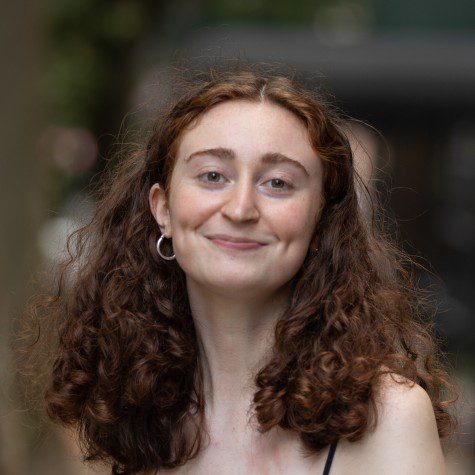New Yorkers and NYU students alike show low turnout for the mayoral primaries
Democratic candidate Eric Adams has an early lead in the polls, but official results are expected to be revealed in mid-July following rounds of ranked-choice voting.
Democratic candidate Eric Adams and Republican candidate Curtis Sliwa take the lead as front runners of their respective races, following voter turnout from Primary Day. However, official results are expected to be revealed in mid-July following rounds of ranked-choice voting. (Images via Wikimedia Commons, Staff Photo and Illustration by Manasa Gudavalli)
June 30, 2021
Nearly 1.1 million New Yorkers voted early in the 2020 presidential election, often having to wait for hours in line. But when Gallatin sophomore Jacob Keller arrived at the polls on June 12 — the first day of early voting for New York City’s 2021 mayoral primary election — the polling site was nearly empty.
“I wish people knew the importance of the primary, but I don’t know if I would know if I was not really involved with politics,” Keller said. “New York City primaries are the general election.”
A similar lack of enthusiasm to vote was observed citywide, and reports showed an underwhelming early voter turnout. By June 20, the last day of early voting, 191,197 people had voted out of 3.7 million registered Democrats and 566,000 registered Republicans, according to the city’s Board of Elections.
Joshua Tucker, a professor of politics at CAS and co-director of the NYU Center for Social Media and Politics, said that one factor behind the city’s low voter turnout was the vastly different dynamic between local elections and the U.S. presidential election.
“Historically, primary numbers are always low,” Tucker said. “We’ll never know definitively what the alternative outcome would have been if we had gotten higher turnout. As social scientists, we think about the costs of voting versus the benefits of voting, and in the primaries, the costs are much higher since you have to learn a lot more and choose the right candidates. In the general election, you like one of the two parties better.”
On June 22, known as Primary Day, voting did gain some momentum, with Democratic candidate Eric Adams and Republican candidate Curtis Sliwa taking the lead as front runners of their respective races.
Tucker said that while it would be a shock if the official Democratic winner did not become mayor in the general election on Nov. 2, it is important to note that the city’s politics have shifted considerably in recent years.
“It’s a fairly recent development that has to do with accelerating trends of political polarization in the United States,” Tucker said. “New York City has always been a heavily Democratic city, with the exception of Staten Island, and after four years of Trump, the idea that there are enough Democrats willing to cross party lines to vote for a Republican candidate for mayor is pretty unlikely.”
Although official statistics are unavailable, anecdotal evidence suggests that turnout among NYU students was similarly low. Keller saw few NYU students post on social media encouraging others to vote — or even vote themselves — compared to the presidential election, but he looked forward to participating in his first New York City primary.
“Students are very good activists, but that doesn’t always correlate to actual voting, especially in an election where there’s no strong, leftward candidate,” Keller said. “For me, there is fear in this primary of certain candidates winning, but that’s not known to everyone.”
Studies show that young adults are less likely to vote in elections. CAS senior Izzy Vieira and the incoming president of NYU’s Politics Society, said the lack of participation in local elections may be because many students decide not to change their voter registration to New York City.
“I have friends who want to stay voting in Nebraska where it is more of a swing state,” Vieira said. “I think it just depends on where the person is coming from and if they’re more permanently living in the city.”
CAS sophomore Uma Upamaka could not vote in the New York primary because she wanted to stay registered in her home state of Missouri. But Upamaka noticed that the majority of students who changed their registrations were actively involved with politics, such as volunteering for political campaigns or studying the subject as a major or minor.
“There was [a] fairly low turnout, considering that it was a primary, and most [people] were in and out with no lines,” Upamaka said. “It’s concerning, and a lot of people are misinformed about voting. I didn’t even know that students could vote in the primaries until a couple of weeks ago.”
Keller, Vieira and Upamaka all added that a big concern among NYU students — both those who voted and those who did not — is mayoral candidates’ plans for the New York Police Department. Upamaka said that the recent violent clashes between police officers and park-goers at Washington Square Park were a concern for many students.
“Maya Wiley would be a candidate most students would pick at NYU, and she said she wanted to take one billion out of the NYPD’s budget,” Upamaka said. “That method of defunding chip by chip is very popular with students.”
Keller, Upamaka and Vieira also noted their support for ranked choice-voting, which made its debut in New York City and allows voters to rank up to five candidates in order of preference rather than selecting a single top choice. Upamaka sees ranked-choice voting as more intuitive for first-time voters, including students, since they do not have to commit to one candidate.
“It gives us a more accurate idea of where people’s ideas are swinging,” Upamaka said. “In single-choice voting for general elections and presidential elections, you find yourself categorizing things into black and white, and ranked-choice voting allows for more nuance in voter population.”
In choosing more than one candidate, Tucker said ranked-choice voting eliminates the tension between sincere voting and strategic voting.
“What’s wonderful about ranked-choice voting is that you can rank your top choice candidate first, and there is no way that you can ever harm your first choice candidate by ranking them first,” Tucker said. “If that candidate isn’t competitive, you still get a say in the election. Political scientists love this because it makes the voting decision easier — you should just be sincere.”
Tucker added that although ranked-choice voting does not help an unpopular candidate gain leverage, the system is more conducive to civil campaigns since candidates try to appeal to all voters.
“There [are] more extremes on both sides, and we’ve also seen an increasing aspect of polarization, which has to do with people disliking supporters of the other party,” he said. “If you have ranked-choice voting, it should lower the temperature and calm things down a little bit because there’s an incentive to not be seen as horrible.”
New York City is known for having a wider range of candidates than other cities in the United States. During the early months of the race, nearly 50 candidates were in the running. Smaller candidates are often overlooked for top contenders, despite having popular policies, due to skewed media coverage and financial backing.
“Bigger candidates take up too much room in the airwaves,” Upamaka said. “There’s not enough room for smaller candidates to squeeze through. They’re overshadowed by the same people saying the same things over and over.”
Art Chang, Democratic mayoral candidate, entrepreneur and Stern alum, sees ranked-choice voting working in his favor as one of the few smaller candidates still on the ballot. Chang currently stands in tenth place.
“I came in as an underdog — as someone who people thought didn’t have a chance of winning. I don’t have a [political action committee], no real billionaires or Trump donors backing me and no real estate money,” Chang said to WSN. “We’re much of a low-budget indie campaign, and we are going to surprise a lot of people.”
Contact Rachel Cohen at [email protected]

























































































































































